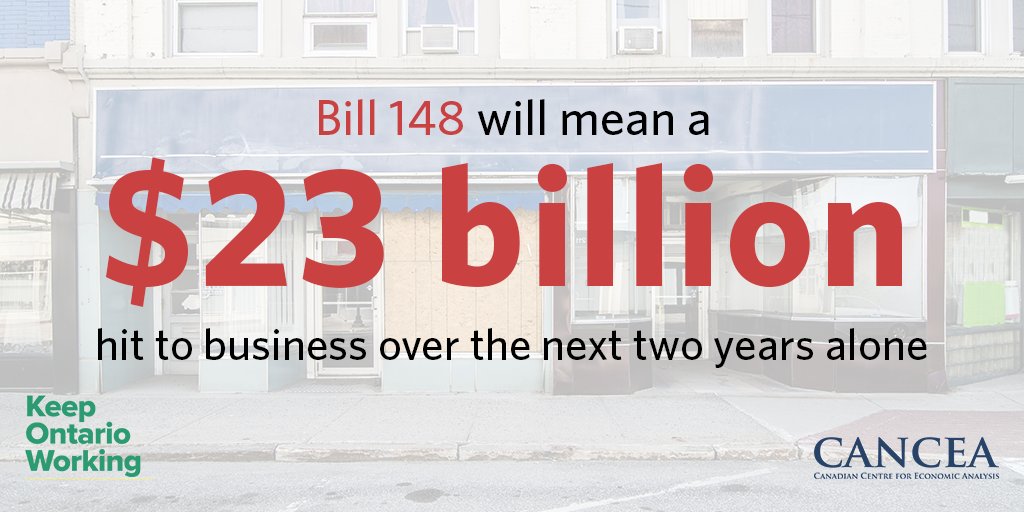 To date there has only been one study done on the proposed impacts of Bill 148, the controversial bill proposing changes to numerous labour laws and a $15 minimum wage. That study was released earlier this week by the Ontario Chamber of Commerce and the Keep Ontario Working Coalition. Proponents of the proposed legislation have been quoting other research from other communities, but the time has come to focus on Ontario and try to determine what these changes will mean for our economy and our communities. The government has not been willing to complete an economic analysis on the proposed changes under Bill 148. The study released this week was conducted by the Canadian Centre for Economic Analysis (CANCEA). CANCEA has done a significant amount of work on the issues addressed, including work for multiple Ministries within the Provincial Government. They do not accept research funding that requires a pre-determined result, and the design and methodology of this study was determined solely by CANCEA. Their findings include:
Several businesses in their comments to us have said their expansion plans are on hold as they come to terms with how the multitude of changes in Bill 148 will affect their business in a very quick time frame. Simply put, the time frame for implementation of the changes to minimum wage, sick days, vacation days, scheduling and unionization is too fast. This bill is still going through the legislative process and would only become official sometime in October. There is also a 20 cent increase to minimum wage scheduled for October 1st. That gives businesses only two or three months to make adjustments. The argument keeps arising that increasing the minimum wage in this quick time frame will reduce the need for social services programs and, from the Premier herself, that more money will be circulating in the economy. This too calls for more evidence-based thinking: How many people will have less dependence on social services programs? How will the government reinvest the savings? By what percentage can businesses expect their sales to go up with all this new money being pumped into local economies? Proponents have been citing examples such as BC and Alberta, that are increasing their minimum wage. However, neither jurisdiction is making a $3.40 jump in 14 months. In BC, the increase was at 75 cent intervals from May 1, 2011 to May 1, 2012 for a total increase of $2.25 to $10.25. Then in September of 2015, BC minimum wage went up $.20 to $10.45, in September 2016 it went to $10.85 and next month it will go up $.50 to $11.35. The increase in Alberta has been on a three-year trajectory of $1.00 in 2016, $1.40 in 2017, and another $1.40 in October of 2018. Those increases are based on research that a gradually increasing minimum wage has little impact on employment levels. That said, colleagues in Alberta tell us that the jump from $12.20 to $13.60 is a great concern for businesses in that province and that there will be some hard choices made. In Seattle, where they have reached $15, a recent study revealed that those individuals the minimum wage increase was supposed to benefit are actually taking home $125 less per month. "As for the economists who publicly supported the move to $15 in a letter recently, 30 of them aren’t even from Ontario, the letter has zero reference to an appropriate time frame for such an increase, none of them have ever had to make payroll, and their findings don’t match what we are being told by local small business owners. Business owners who know what it means to employ people,” adds Harrison. To suggest that there are only positive impacts from the changes in this legislation is to willfully ignore the impact of a whole bank of constituents. All legislation has pros and cons and fully understanding the impact has never been more important. A responsible government means being fair to all constituents under its guard – especially when one group is bearing the weight and full responsibility of any proposed changes. Comments are closed.
|
AuthorThe Peterborough and the Kawarthas Chamber of Commerce acts as a catalyst to enhance business growth, opportunity, innovation, partnerships and a diverse business community. Archives
June 2024
Categories |
|
Copyright Greater Peterborough Chamber of Commerce. All rights reserved.
175 George Street North, Peterborough, ON, K9J 3G6 Phone: (705) 748-9771 | (705) 743-2331 Home | Calendar | Site Map | Privacy | Accessibility |
